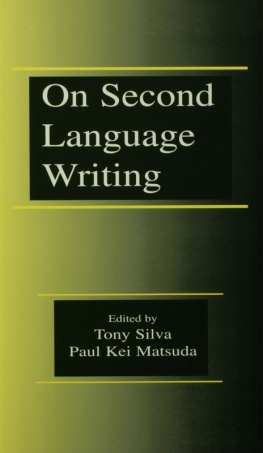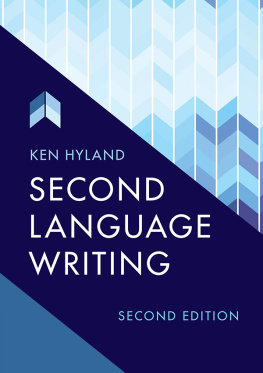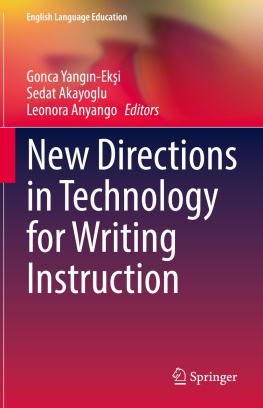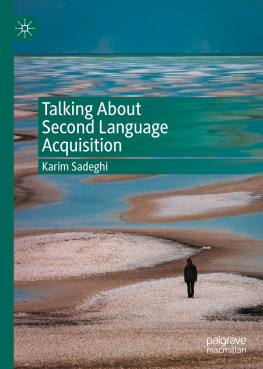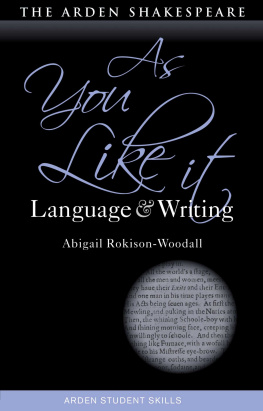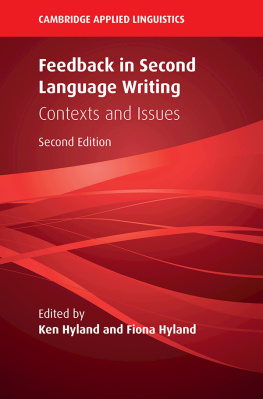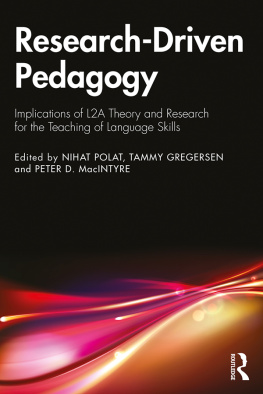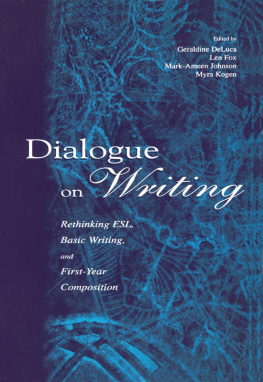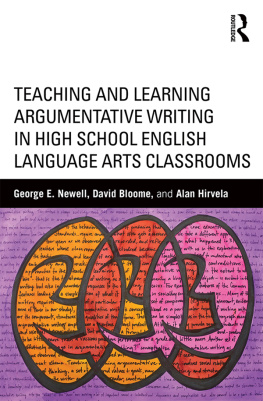On Second Language Writing
On Second Language Writing
Edited by
Tony Silva
Purdue University
Paul Kei Matsuda
Miami University

Copyright 2001, by Lawrence Erlbaum Associates, Inc.
All rights reserved. No part of the book may be reproduced in any form, by photostat, microform, retrieval system, or any other means, without prior written permission of the publisher.
Lawrence Erlbaum Associates, Inc., Publishers
10 Industrial Avenue
Mahwah, NJ 07430
Cover concept by Paul Kei Matsuda
Cover design by Kathryn Houghtaling Lacey
Library of Congress Cataloging-in-Publication Data
On second language writing / edited by Tony Silva and Paul Kei Matsuda.
p. cm.
Includes bibliographical references and index.
ISBN 0-8058-3515-6 (alk. paper)
ISBN 0-8058-3516-4 (pbk. : alk. paper)
1. Rhetoric-Study and teaching (Higher) 2. Second language acquisition. I. Silva, Tony J. II. Matsuda, Paul Kei.
P53.27 .05 2000
808.040711dc21 | 00-039402 |
CIP |
Books published by Lawrence Erlbaum Associates are printed on acid-free paper, and their bindings are chosen for strength and durability.
For Margie and Aya
Preface
Twenty five years ago, finding scholarship on second language (L2) writing would have been very difficult. Fortunately, this is no longer the case. In the last quarter century, the amount of scholarly work on second language writing has increased dramatically. L2 writing scholars have published literally hundreds of articles in a variety of composition studies and second language studies journals; similar numbers of papers have been presented at regional, national, and international professional meetings. More than 400 doctoral dissertations addressing second language writing issues have been written and defended. The field now has a journal and two book length annotated bibliographies devoted exclusively to second language writing. Recent years have seen the publication of a number of monographs, collections of original papers, and reprint collections addressing in whole or in part, in general and in particular, the area of L2 writing. And very recently, an online L2 writing research network has come into being.
A couple of years ago, believing that the scholarship on second language writing was reaching a critical mass, we felt a need to take stock of this large and increasing body of knowledge. Consequently, we decided to host a symposium on second language writing at Purdue University to which we invited a number of widely known and respected second language writing specialists to systematically address basic concerns in the field, to consider the state of the art at the end of the century (and the millennium) with regard to L2 writing teachers, students, theory, research, instruction, assessment, politics, articulation with other disciplines, and standards. Given our institutional context, we thought such a symposium would work best as a small gatheringwith about 100 participants. We felt, however, that there might be more than a hundred people interested in what our speakers had to say. So we asked our contributors to, in addition to preparing brief talks, write formal papers for a collection meant to be read rather than listened to. This they generously did, and this collection is the result of that work.
In , The Composition of a Life in Composition, Barbara Kroll presents an enlightening and entertaining autobiographical reflection on her life as a teacher of language and composition. In this reflection, she focuses on five episodes in her life that helped her to define herself as a professional. She punctuates her narrative with interpretive breaksbrief personal commentaries that reflect on and enrich her narrative. Barbaras message is that the personal is professional and that understanding student success or failure requires a pioneering spirit, a willingness to reflect on ones actions, and an openness to change.
focus on student second language writers. In Hearing Voices: L2 Students Experiences in L2 Writing Courses, Ilona Leki listens for the voices of students to get their take on what goes on in L2 writing classes. She does this by focussing on five qualitative studies (four done by other researchers and one of her own) that detail specific problems observed over the long term in L2 writing classes or described by the students who experienced them. The results of these studies, which reflect disjunctures between the goals and objectives of teachers and students, serve to give L2 writing professionals a better idea of the nature of students and educational systems and to stimulate further reflection. In On the Question of Power and Control, Pat Currie focuses on the evaluation of L2 students writing in terms of the amount, nature, and use of power by teachers and institutions. Specifically, she considers the consequences of three policies: restrictions on the number of non-English for Academic Purposes (EAP) courses in which students are permitted to enroll, the evaluation of EAP writing, and the inclusion of EAP course grades in a students grade point average. On the basis of this consideration, Pat calls for a careful and critical examination of the effects of these policies on L2 writers and teachers and urges teachers to advocate on the students behalf to change policies that discriminate against or disadvantage L2 writers.
exist no viable predictive models of writing, second language writing professionals might be better served at this point by a descriptive model of writing developed through the characterization of conditions on learning to write. The generalizations thus produced could serve as a foundation for more sophisticated theory building in the future. In Does Second Language Writing Have Gender?, Diane Belcher looks for signs of feminization (i.e., identification with innovative epistemo-logical and pedagogical elements) in second language writing scholarship with regard to research paradigms, discourse style, and cultural (gender) sensitivity. More specifically, Diane examines the extent to which second language writing research does or does not practice traditional science, is or is not agonistic or adversarial in its theoretical stances, and does or does not treat gender as a salient cultural feature. After presenting her (nonadversarial) argument, Diane concludes that second language writing researchers are more progressive, postmodern, and feminized than their counterparts in some other areas of second language studies and that there is good reason to be optimistic that second language writing research will continue to move in this direction.
full and explicit reporting of methodology, for measuring and reporting reliability, and for conducting studies to validate measures.
In , Fourth Generation Writing Assessment, Liz Hamp-Lyons sketches a brief history of the first three generations of writing assessmentdirect testing, multiple choice testing, and portfolio based assessment. She then goes on to enumerate the key qualities that will characterize fourth generation writing assessment. She suggests that these qualities will be technological (drawing on advances in computer applications), humanistic (understanding writing as a complex set of processes), political (involving competing interests and differences in beliefs and values) , and ethical (ensuring fairness in the assessment of writing).
focus on L2 writing instruction from different angles. In Instructional Strategies for Making ESL Students Integral to the University, Trudy Smoke, using examples and illustrations from her instructional context (the City University of New York), puts forth strategies that she feels have strengthened support for L2 writing throughout the college and community and have helped convince colleagues, friends, and students to advocate on behalf of ESL programs and support services. These strategies include linking ESL classes with discipline-specific courses (i.e., content based instruction), collaborating with teachers across disciplines (e.g., in block programs for entering students), obtaining grants for collaborative projects (which bring prestige and seed money for innovative programs and teaching), and developing writing assignments that help students gain political power (through the use of a critical-democratic pedagogy and theme based second language writing courses). In Advanced EAP Writing and Curriculum Design: What Do We Need to Know?, Joy Reid focuses on the implications of EAP writing research, on the development of multiple needs analysis to identity college and university writing demands, and on the issues that must be investigated if curricular integration is to be accomplished. More specifically, she sees curriculum design as based on students needs, principles underlying theory and practice, and external expectations and constraints. She describes EAP writing curricula as involving collecting, describing, and assessing authentic information, and then integrating the results into course objectives that will structure classroom pedagogy.
Next page
